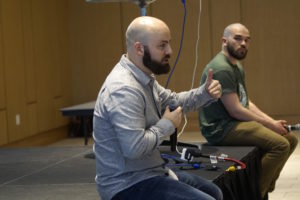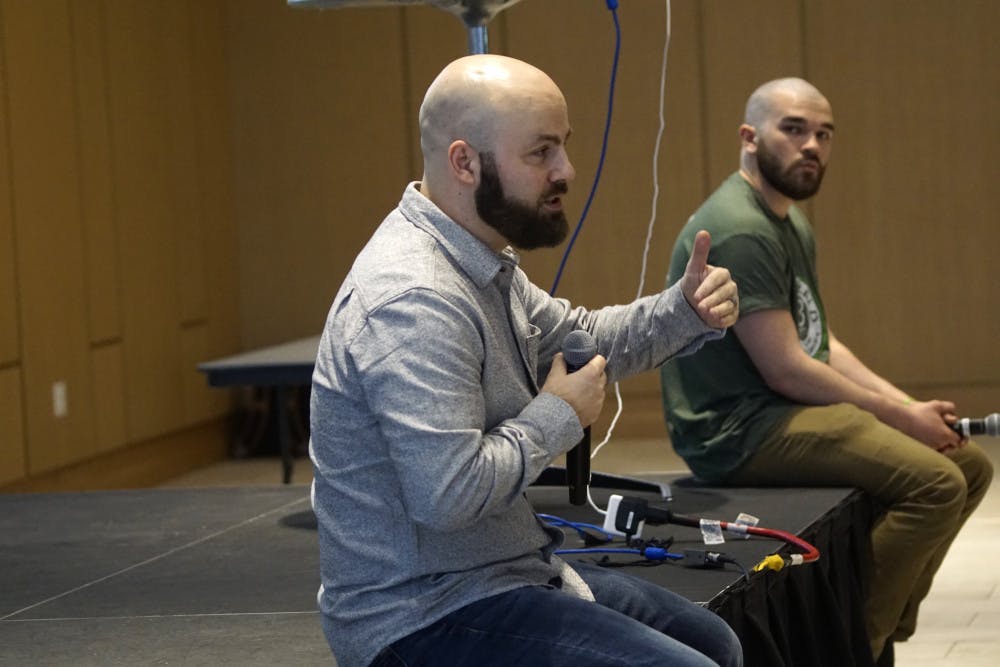By Tiffany Rutkowski
Staff Writer
The College’s Interfraternity Council invited a keynote speaker to campus to address the detrimental stigmas and stereotypes about being a college man — more specifically a fraternity brother — in today’s climate, as well as to offer ideas toward a solution on Friday, April 6.
Casey J. Cornelius, CEO of For College For Life and a leading national voice on the topic of healthy masculinity, presented his discussion, “Be The Man: A Movement for Healthy Masculinity.”
“It is a hard time to be a college man,” Cornelius said. “It’s also particularly hard to be a fraternity man in today’s society.”
His keynote speech tackled four main topics — current issues, socialization of masculinity, relationships and the “Be The Man” challenge.
As a fraternity man and a long time professional in higher education, Cornelius saw college campuses and organizations struggling to respond to the media, which he believes is a key component in the problematic portrayal of all college and fraternity men in the same light.
Using headlines with words such as dangerous and toxic, the media points to issues of poor misconduct, declining academic success and a lack of positive male role models among college fraternity members, according to Cornelius.
“We all get painted with the same brush,” he said. “But as a proud fraternity man, I would say we have brought a lot of it on ourselves as well.”
Michael O’Connor, a senior interdisciplinary business major and president of the College’s Interfraternity Council, agrees with Cornelius.

“The goal here was to just educate all the people who came to the event and to invite them to understand the idea of healthy masculinity versus toxic masculinity,” O’Connor said.
Toxic masculinity is the socially-constructed idea that there is only one possible way to embody the male gender. According to Cornelius, it suggests that women should be looking for a man with violent, sex-obsessed, controlling, unfeeling and unresponsive tendencies.
On top of educating men across college campuses, Cornelius invites men to be part of the “Be The Man” challenge. Participants receive a token that reminds them to be a man who helps others and to embrace the idea of healthy masculinity, according to Cornelius.
“If you look at someone else’s failure as your success, this is where the problem comes in,” Cornelius said. “Even if the guy sitting next to you wears different letters, his success is your success.”
Although Cornelius’ event attracted a predominantly male audience, a small handful of female students attended and found the presentation valuable.
“I got a lot out of it as a woman,” said Zuri Gill, a senior psychology major. “Say I have a son one day — it’s something I can keep in mind.”
Cornelius started focusing on his movement toward health masculinity and being a better man for the most important girl in his life — his daughter.
“The moment I start focusing on being the best man that I could be was the moment my daughter was born,” Cornelius said.
With healthy masculinity in mind, Cornelius said he takes time every night to reflect on his day and his growth as a man.
“I ask myself, ‘did I get better today?’ I try not to hide from it if the answer is ‘no,’” Cornelius said.
After shedding light on his experiences, Cornelius offered a chance for men at the College to start challenging themselves to always improve.
“We have to be the man who uses our voices for positive things,” Cornelius said. “We need to start a process of course correcting.”







